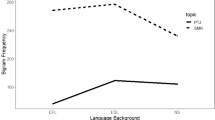Abstract
The appropriate use of formulas in discourse involves the ability to manage a complex interplay of linguistic, paralinguistic, and pragmatic properties. Given this complexity, we will try to answer the following question: what type of information about formulas do learners need to develop their own pragmatic competence? The problem is addressed from both theoretical and applied points of view. Although the present study is based on analysis of French formulas, it seems that a similar method can be applicable to other foreign languages. The article is structured as follows. Section 1 presents an overview of the previous work on phraseology and the research questions for this study. Section 2 discusses the nature of formulas. Once their main characteristics have thus been identified, Sects. 3 and 4 consider semantic, prosodic, gestural, and pragmatic challenges learners face in learning formulas. Section 5 focuses on the treatment of formulas in dictionaries. A model for describing formulas is illustrated in Sect. 6. Some conclusions are drawn at the end.
Access this chapter
Tax calculation will be finalised at checkout
Purchases are for personal use only
Similar content being viewed by others
References
Arhangel’skiĭ, V.: Ustoĭčivye frazy v sovremennom russkom âzyke. Izdatel’stvo Rostovskogo Universiteta, Rostov-Na-Donu (1964)
Baranov, A., Dobrovol’kiĭ, D.: Aspekty teorii frazeologii. Znak, Moskva (2008)
Baranov, A., Dobrovol’skiĭ, D.: Osnovy frazeologii. Flinta, Nauka, Moskva (2013)
Bardovi-Harlig, K.: Formulas, routines, and conventional expressions in pragmatics research. Ann. Rev. Appl. Linguist. 32, 223 (2012)
Barron, A.: Acquisition in Interlanguage Pragmatics: Learning How to Do Things with Words in a Study Abroad Context, p. 186. John Benjamins, Amsterdam (2003)
Blanco Escoda, X., Mejri, S.: Les pragmatèmes. Classiques Garnier, Paris (2018)
Blumenthal, P., Mejri, S.: Les séquences figées: entre langue et discours. Steiner, Stuttgart (2008)
Burger, H., Dobrovol’skij, D., Kühn, P., Norrick, N.R.: Phraseologie: ein internationales Handbuch zeitgenössischer Forschung. Phraseology: An International Handbook of Contemporary Research. Walter de Gruyter, Berlin, New York (2007)
Cacciari, C., Tabossi, P.: Idioms: Processing, Structure, and Interpretation. Erlbaum, Hillsdale (1993)
Cahiers de lexicologie 2019, n° 114 – 1, Les phrases préfabriquées: Sens, fonctions, usages (2019)
Carter, R.: Vocabulary: Applied Linguistic Perspectives. Routledge, London, New York (1998)
Conklin, K., Schmitt, N.: The processing of formulaic language. Ann. Rev. Appl. Linguist. 32, 47 (2012)
Corpas Pastor, G., Mitkov, R.: Computerised and Corpus-Based Approaches to Phraseology. Monolingual and Multilingual Perspectives. Springer, Cham (2019).https://doi.org/10.1007/978-3-030-30135-4
Cowie, A.P.: Phraseology: Theory, Analysis, and Applications. Oxford University Press, Clarendon Press, Oxford, New York (1998)
Dobrovol’skij, D., Piirainen, E.: Figurative Language: Cross-Cultural and Cross-Linguistic Perspectives. Elsevier, Amsterdam, Boston, London (2005)
Everaert, M., Linden, E.-J., Schenk, A.: Idioms: Structural and Psychological Perspectives. Erlbaum Associates, Hillsdale (1995)
González Rey, I.: La didactique du français idiomatique. EME, Fernelmont (2007)
Granger, S., Meunier, F.: Phraseology: An Interdisciplinary Perspective. John Benjamins, Amsterdam, Philadelphia (2008)
Granger, S., Meunier, F.: Phraseology in Foreign Language and Teaching. John Benjamins Publishing Company, Amsterdam, Philadelphia (2008)
Gréciano, G.: Signification et dénotation en allemand: la sémantique des expressions idiomatiques. Université de Metz, Metz (1983)
Gross, G.: Les expressions figées en français: noms composés et autres locutions. Ophrys, Gap, Paris (1996)
Kecskés, I.: Intercultural Pragmatics, p. 139. Oxford University Press, Oxford, New York, Auckland (2014)
Kerbrat-Orecchioni, C.: Heurs et malheurs du partage du sens. In: Cislaru, G., Nyckees, V. (dir.) Le partage du sens. Approches linguistiques du sens commun, p. 199. ISTE editions, London (2019)
Langacker, R.W.: Metaphoric gesture and cognitive linguistics. In: Cienki, A., Müller, C. (eds.) Metaphors and Gesture, p. 250. John Benjamins, Amsterdam (2008)
Langages 2013/1, n° 189, Vers une extension du domaine de la phraséologie (2013)
Liddicoat, A.J., Scarino, A.: Intercultural Language Teaching and Learning, pp. 1–2. Wiley-Blackwell, Oxford (2013)
Melerovič, A., Mokienko, V.: Frazeologizmy v russkoĭ reči. Russkie slovari, Astrel’, Moskva (2001)
Moeschler, J.: Complexité et dynamique du sens. Interrélations entre pragmatique cognitive et pragmatique interculturelle. Langages 2021/2, n° 222, pp. 43–58 (2021)
Moon, R.: Fixed Expressions and Idioms in English: A Corpus-Based Approach. Clarendon Press, Oxford (1998)
Pamies, A., Balsas, I., Magdalena, A. (eds.): Lenguaje figurado y competencia interlingüística Granada Aspectos teóricos. Editorial Comares, Granada (2018)
Paquot, M., Granger, S.: Formulaic language in learner corpora. Ann. Rev. Appl. Linguist. 32, 130 (2012)
Phraseologie und parömiologie. Homepage. https://paedagogik.de/phraseologie-und-paroemiologie/. Accessed 26 Apr 2022
Popov, R.: Frazeologizmy sovremennogo russkogo âzyka s arhaičnymi značeniâ-mi i formami slov. Vysšaâ škola, Moskva (1976)
Polio, C.: Annual Review of Applied Linguistics. Formulaic Language, vol. 32 (2012)
Rahilina, E.: Lingvistika konstrukciĭ. Azbukovnik, Moskva (2010)
Sailer, M., Markantonatou, S.: Multiword Expressions: Insights from a Multi-Lingual Perspective. Language Science Press, Berlin (2018)
Soloduho, È.: Problemy internacionalizacii frazeologii. Izdatel’stvo Ka-zanskogo Universiteta, Kazan’ (1982)
Taguchi, N.: Teaching pragmatics: trends and issues. Ann. Rev. Appl. Linguist. 31, 298 (2011)
Wood, D.: Perspectives on Formulaic Language: Acquisition and Communication. Continuum, London, New York (2010)
Wray, A.: Formulaic Language: Pushing the Boundaries. Oxford University Press, Oxford (2008)
Acknowledgments
I am grateful to Pascale Chamerois and Rebecca Clayton, my students, and anonymous reviewers for helpful comments on the drafts of this article.
Author information
Authors and Affiliations
Corresponding author
Editor information
Editors and Affiliations
Rights and permissions
Copyright information
© 2022 The Author(s), under exclusive license to Springer Nature Switzerland AG
About this paper
Cite this paper
Berthemet, E. (2022). Teaching and Learning French Formulas. In: Corpas Pastor, G., Mitkov, R. (eds) Computational and Corpus-Based Phraseology. EUROPHRAS 2022. Lecture Notes in Computer Science(), vol 13528. Springer, Cham. https://doi.org/10.1007/978-3-031-15925-1_3
Download citation
DOI: https://doi.org/10.1007/978-3-031-15925-1_3
Published:
Publisher Name: Springer, Cham
Print ISBN: 978-3-031-15924-4
Online ISBN: 978-3-031-15925-1
eBook Packages: Computer ScienceComputer Science (R0)




